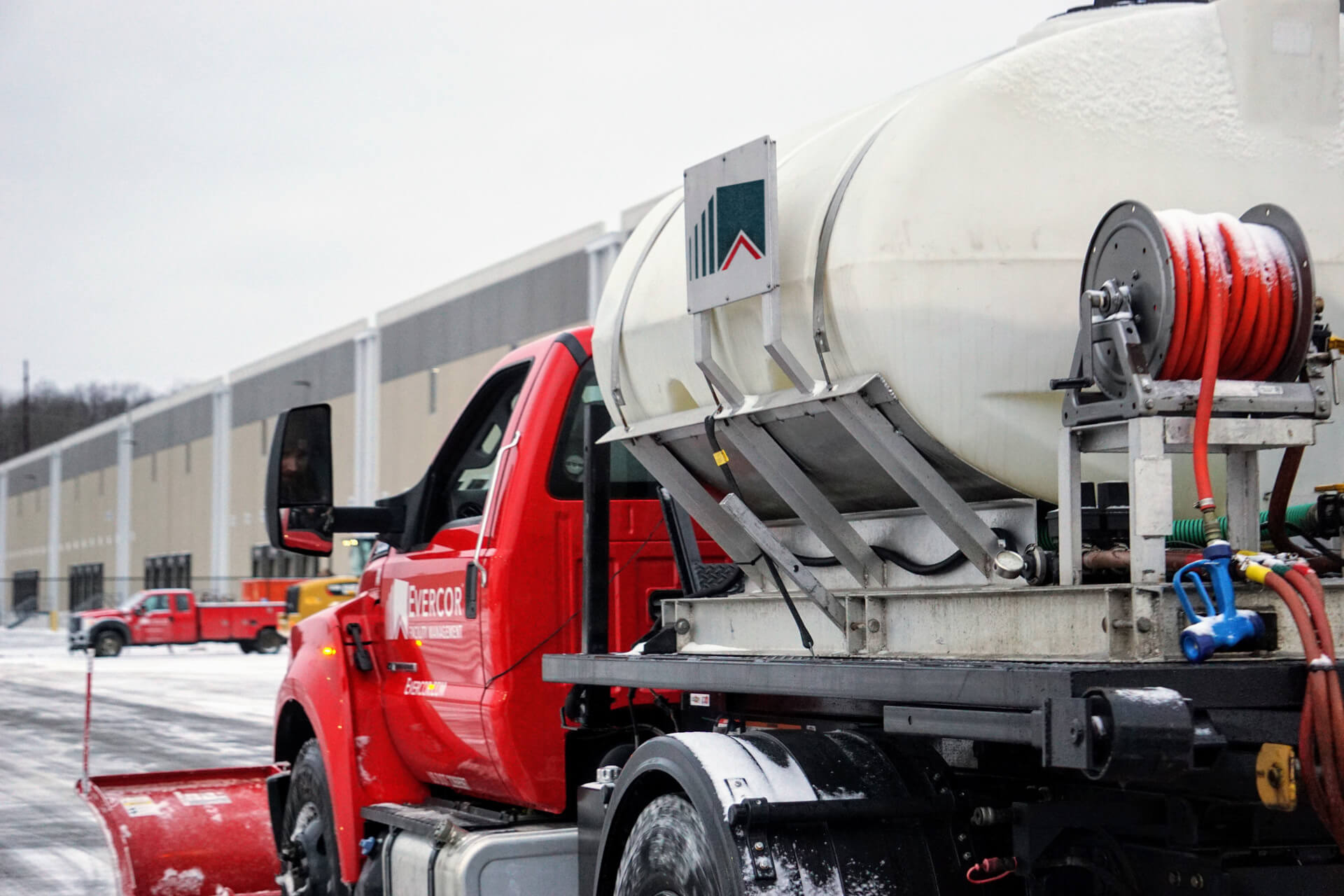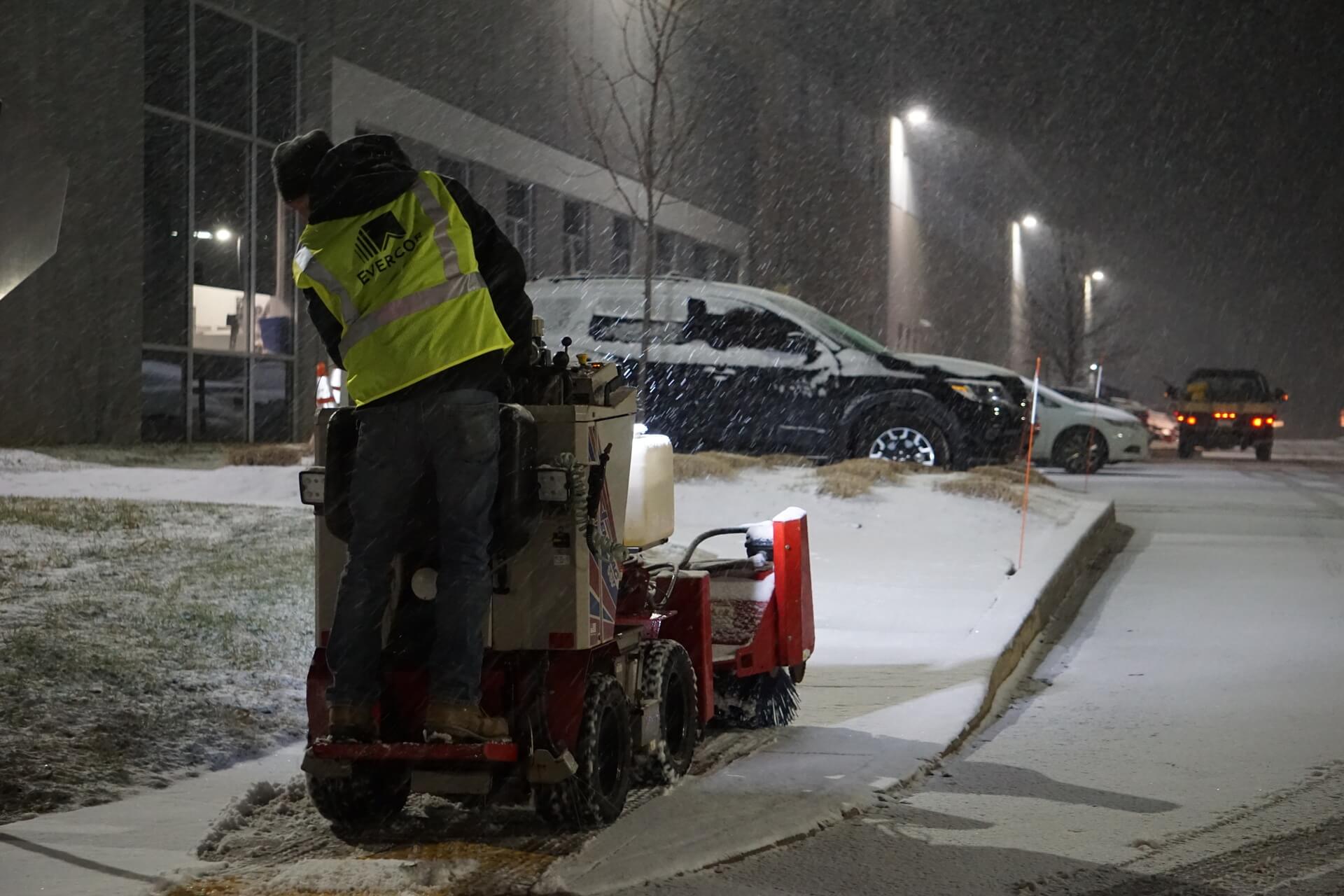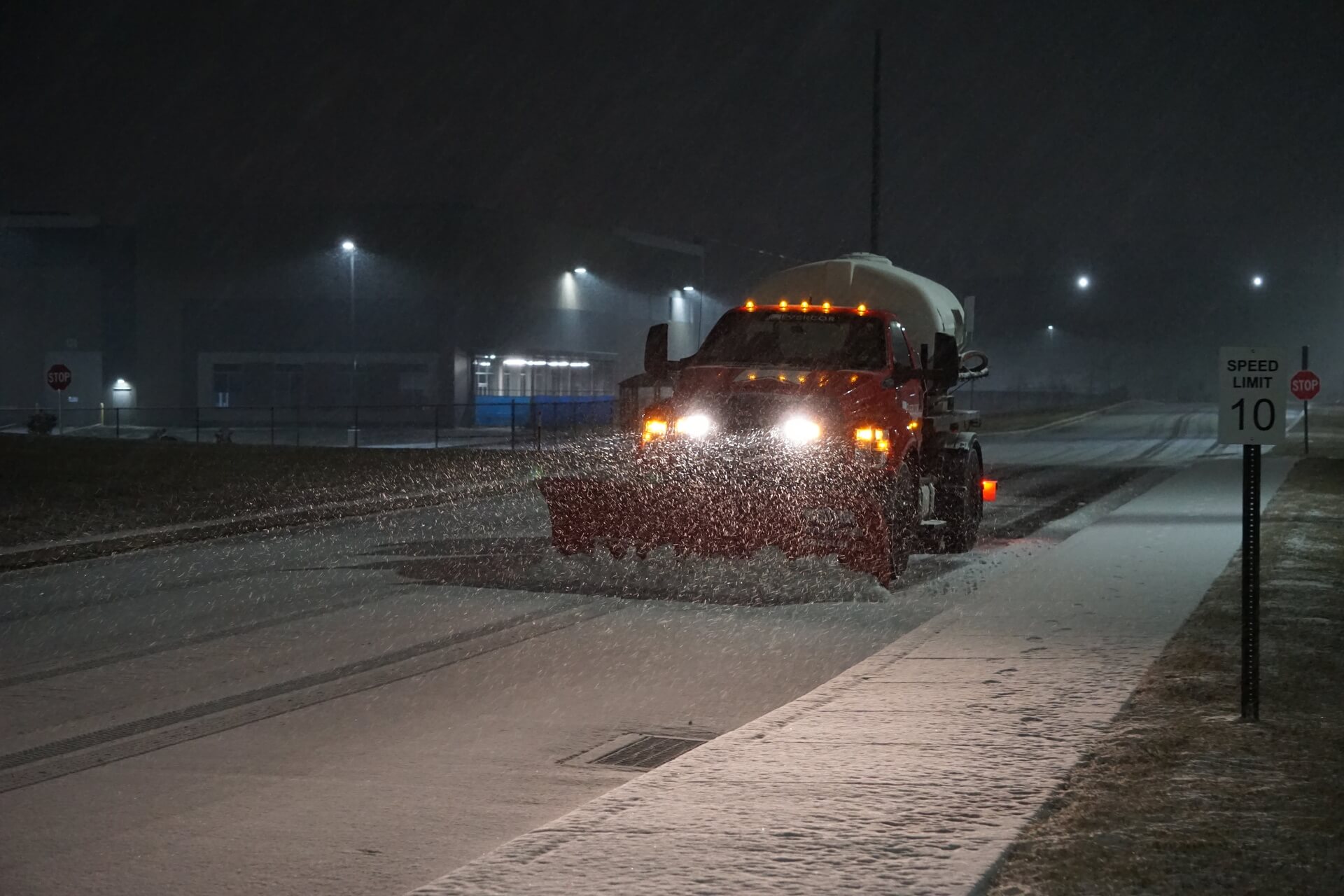As winter arrives, the challenge of maintaining safe and accessible commercial properties becomes paramount. Snow and ice accumulation can create hazardous conditions for both pedestrians and vehicles. To ensure the safety of employees, customers, and visitors, it’s crucial to employ effective de-icing and anti-icing strategies. In this blog post, we will explore the different types of de-icing and anti-icing agents commonly used in snow and ice management for commercial properties.
The Difference Between De-icing and Anti-icing Agents in Commercial Snow and Ice Management
![]()
Understanding the difference between de-icing and anti-icing agents is crucial in commercial snow and ice management. Here’s the distinction:
De-icing agents are applied after snow or ice accumulation. They melt existing ice and facilitate its removal. These agents actively melt snow and ice by lowering the freezing point. However, they may be abrasive, potentially affecting surfaces over time. It’s important to note that de-icing effects may be short-lived and require periodic reapplication as ice continues to accumulate.
On the other hand, anti-icing agents are applied before a snow event. They act as a proactive measure to prevent ice formation. By creating a protective barrier, these agents prevent ice from bonding to surfaces, reducing initial ice buildup. As a result, anti-icing minimizes the need for extensive de-icing efforts. Typically, anti-icing agents are less abrasive and gentler on various types of surfaces.
By understanding these differences, commercial snow and ice management teams can take a more strategic approach to keep properties safe during winter weather events.
Different Types of De-Icing & Anti-Icing Agents for Commercial Properties
As winter approaches, commercial property owners are faced with the task of de-icing their properties to ensure the safety of their employees, customers, and tenants. There are different types of de-icing and anti-icing agents that these property owners can choose from, each with varying chemical compositions suitable for specific conditions and surfaces.
![]()
Rock Salt
One of the most commonly used and readily available de-icing agents is rock salt, which is highly effective on surfaces like asphalt and concrete. Rock salt works by lowering the freezing point of water, preventing ice formation and aiding in melting of existing ice. While rock salt is effective at moderate temperatures, its efficiency decreases significantly in extremely cold conditions.
Ice Melt
Another option is ice melt, a chemical compound-based deicer that works at lower temperatures than rock salt. Chemical ice melts are a safer and more eco-friendly option compared to rock salt. While it may be slightly more expensive, the visible results and benefits make it worthwhile. Rock salt poses some potential risks to wildlife and can damage treated surfaces over time. It’s important to consider the environment and choose deicers carefully to prevent harm to local ecosystems.
Liquid De-icer
Liquid de-icer provides convenience for larger commercial properties, as it can be easily sprayed and helps prevent re-freezing. Selecting the optimal de-icer for commercial properties depends on factors such as surface type, climate, and budget considerations. It’s crucial to choose wisely to ensure optimal results in maintaining safe, ice-free surfaces.
Anti-Icing Agents
Anti-icing agents can take various forms, including liquid solutions or chemicals that are sprayed or spread onto surfaces. Common anti-icing agents include salt brine, calcium chloride, magnesium chloride, and potassium acetate. These substances lower the freezing point of water, preventing ice from forming or making it easier to remove. Anti-icing agents are often used in conjunction with other winter maintenance strategies, such as plowing or mechanical removal, to ensure safer conditions during winter weather events.
Application Techniques and Best Practices For De-icing & Anti-icing Agents
![]()
When it comes to effective snow and ice management for commercial properties, employing the right application techniques and adhering to best practices is paramount. These techniques play a crucial role in determining the success of de-icing and anti-icing strategies, ensuring that businesses remain operational and safe even in the harshest winter conditions.
Application Techniques:
Proper application techniques are essential for achieving optimal results. Commercial snow and ice management companies utilize a range of methods, such as spreading, spraying, and pre-wetting. Spreading involves evenly distributing de-icing agents across surfaces, while spraying allows for more targeted application. Pre-wetting, which involves mixing de-icing agents with liquids, enhances their effectiveness by promoting quicker melting and adherence to surfaces. Choosing the right technique depends on factors like the type of surface, weather conditions, and desired outcome.
Timing and Rates:
Timely application and appropriate rates are crucial aspects of effective snow and ice management. Applying de-icing or anti-icing agents before a snowstorm can prevent ice from forming and make subsequent removal easier. Determining the right application rate requires consideration of factors like temperature, humidity, and traffic volume. Applying too much can be wasteful and potentially harmful to the environment, while applying too little might not achieve the desired results. Striking the right balance is key to maximizing the efficiency of these strategies.
Temperature Thresholds:
Understanding temperature thresholds is essential for choosing between de-icing and anti-icing strategies. De-icing agents, such as rock salt, are typically more effective at higher temperatures, while anti-icing agents, like brine solutions, are often used in advance of a storm when temperatures are lower. Being aware of these thresholds allows snow and ice management professionals to make informed decisions and apply the most suitable methods for the given conditions.
Factors Influencing Application:
Several factors influence the application of de-icing and anti-icing agents. The type of surface – whether concrete, asphalt, or other materials – determines the compatibility of different agents and the potential for surface damage. Traffic volume plays a role in determining the durability of the treatment, as high-traffic areas may require more frequent applications. Weather conditions, including temperature fluctuations and precipitation, impact the overall effectiveness of the chosen strategies. By considering these factors, commercial snow and ice management teams can tailor their approach to achieve optimal results.
Incorporating these application techniques and best practices ensures that commercial properties remain accessible, safe, and fully functional throughout the winter months. By working closely with experienced snow and ice management professionals, businesses can confidently navigate the challenges posed by winter weather and maintain their operations without compromising on safety or efficiency.
Choosing the Right De-Icing & Anti-Icing Agents For Your Commercial Property
De-icing and anti-icing for your commercial property is a science that requires careful consideration of many factors. Weather, environmental conditions, and the type of ice or snow present will all influence the best approach to tackling a slippery situation. Through proper use of both de-icing and anti-icing agents, you can provide a safe space during the winter months while protecting the value of your property. Evercor Facility Management has experienced snow and ice management professionals who can advise on ideal approaches for de-icing & anti-icing agents for any specific environment. Our team can help navigate the perfect solution for any large commercial property so please don’t hesitate to contact us today for more information about our snow and ice management services.


